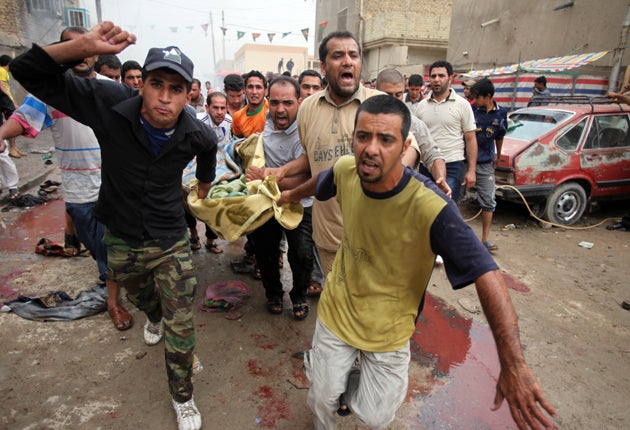Scores killed as al-Qa'ida targets Baghdad's Shias

Your support helps us to tell the story
From reproductive rights to climate change to Big Tech, The Independent is on the ground when the story is developing. Whether it's investigating the financials of Elon Musk's pro-Trump PAC or producing our latest documentary, 'The A Word', which shines a light on the American women fighting for reproductive rights, we know how important it is to parse out the facts from the messaging.
At such a critical moment in US history, we need reporters on the ground. Your donation allows us to keep sending journalists to speak to both sides of the story.
The Independent is trusted by Americans across the entire political spectrum. And unlike many other quality news outlets, we choose not to lock Americans out of our reporting and analysis with paywalls. We believe quality journalism should be available to everyone, paid for by those who can afford it.
Your support makes all the difference.A series of bombs targeting Shia areas rocked Baghdad yesterday, killing at least 56 people in an apparent backlash after Iraq touted a series of blows against a weakened al-Qa'ida-led insurgency.
Eight people were also killed by bombs in the Sunni west of the country, less than a week after Iraqi security forces backed by US troops killed al- Qa'ida's top two leaders in Iraq.
Thirteen blasts hit different areas of the Iraqi capital around the time of Muslim prayers, mostly near Shia mosques and at a marketplace, an Interior Ministry source said.
Three bombs targeted worshippers outside the main office of the uncompromising anti-American Shia cleric Moqtada al-Sadr in the crowded Sadr City slum. Those blasts killed 39 people and wounded 56, generating denunciations of the security forces. Some youths threw stones at an Iraqi army vehicle.
"Why do they always target us? We are peaceful people. We come to pray and then go on our way," one survivor who would not identify himself said in an angry tirade.
The attacks, one of Iraq's deadliest in recent weeks, also wounded around 120 people and signalled the possibility of a rise in violence after a March national election produced no clear winner and left a power vacuum for insurgents to exploit.
"Targeting prayers in areas with a certain majority is a revenge for the losses suffered by al-Qa'ida," said Major General Qassim al-Moussawi, the Baghdad security spokesman, referring to Iraq's Shia Muslim majority. He added: "We expect such terrorist acts to continue."
Last Sunday, al-Qa'ida's leader in Iraq, Abu Ayyub al-Masri, and Abu Omar al-Baghdadi, the purported head of its affiliate, the Islamic State of Iraq, were killed in a raid in a rural area northwest of Baghdad by Iraqi and US forces.
The strike against al-Qa'ida's Iraq leadership has been accompanied by a string of smaller battlefield victories in which more than 300 suspected al-Qa'ida operatives have been arrested and 19 killed, according to US and Iraqi officials.
In another of yesterday's attacks, 11 were killed by a car bomb and a suicide bomber near a Shia mosque in al-Ameen district in south-eastern Baghdad. A car bomb killed five near a mosque in the northwestern neighbourhood of al-Hurriya, police said.
"These are acts of revenge that are intended to send a message to the Iraqi government and the world that al-Qa'ida's existence will not be affected by the killing of specific leaders," Hameed Fadhel, an Iraqi political analyst from Baghdad University said. "They want to say they are still here."
Several hours earlier, seven members of one family were killed in a series of blasts in Khalidiya, a town in Iraq's turbulent western province of Anbar, 83km (50 miles) west of Baghdad. One police officer died trying to defuse a bomb.
Join our commenting forum
Join thought-provoking conversations, follow other Independent readers and see their replies
Comments